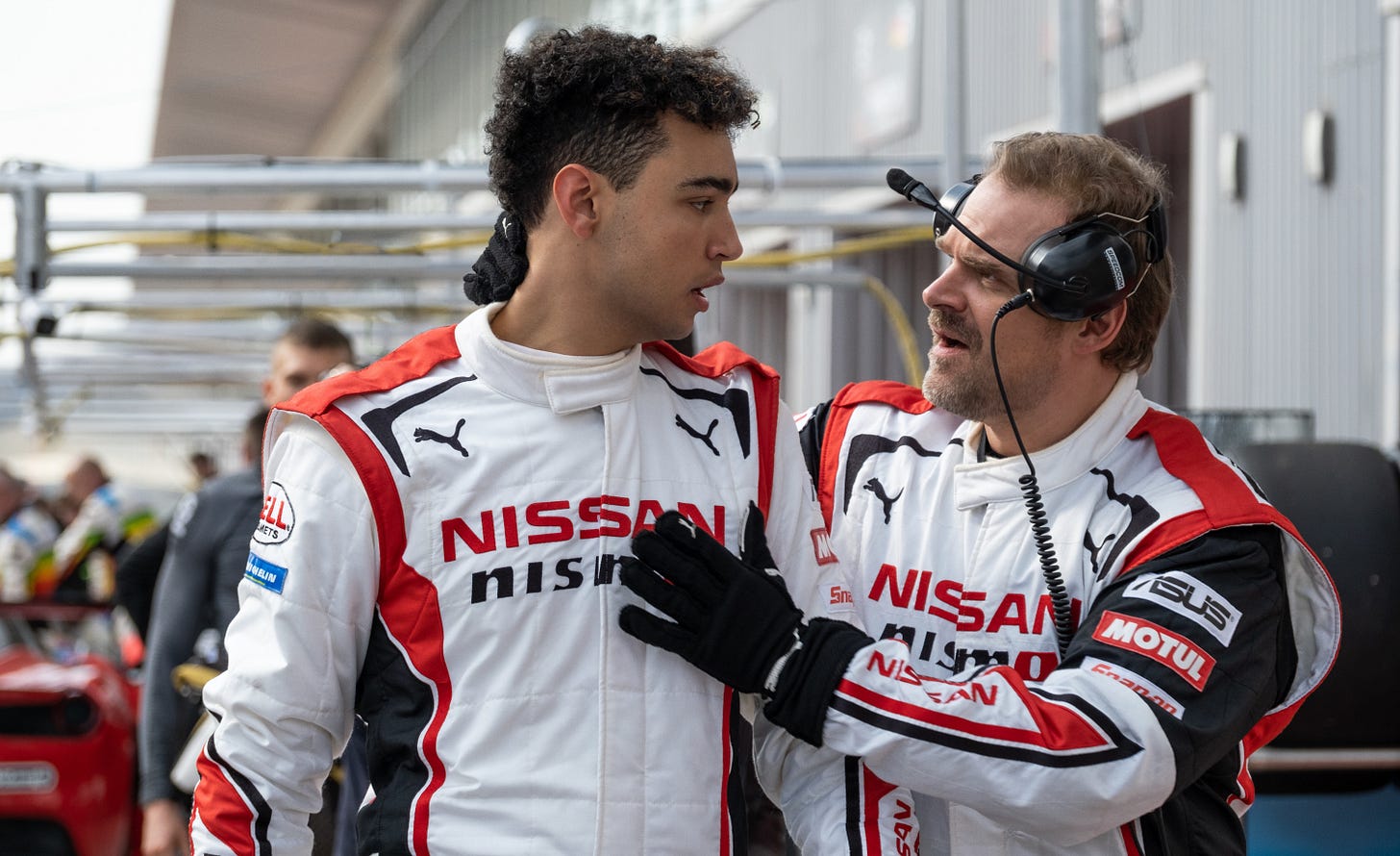‘Gran Turismo’ Review
A straightforward sports biopic gets the job done.
Gran Turismo has been tagged as a “video game” movie, which is understandable given the title of the film is the same title as the popular driving simulator for the PlayStation consoles. But it’s not really a video game movie so much as a sports movie; it has more in common with Rudy than Street Fighter.
Jann Mardenborough (Archie Madekwe) is that young man. An underwear salesman whose obsession with the video game Gran Turismo is a constant source of disappointment to his footballer father, Steve (Djimon Hounsou), Jann gets a chance to compete at the GT Academy dreamed up by Nissan marketer Danny Moore (Orlando Bloom). Danny hopes to inspire a new generation of youths not only to get on the racetrack but simply to get behind the wheel, as teens demonstrate less interest in driving in the age of Uber. To do that, he wants to give sim racers the chance to get on the racetrack, picking a handful of the best players from around the world to take a shot at becoming real racers under the watchful eye of Jack Salter (David Harbour), a driver who flamed out after a crash at 24 Hours of Le Mans.
Despite the video-game trappings—Jann sometimes visualizes driving lanes to give him an advantage over his competitors; he knows the feel of the cars so well from his time playing the simulator that he can tell when his brakes are glazed, much to the bemusement of Jack—this is a pretty straightforward sports-movie setup. Underdog whose father doubts his skills? Check! A salty trainer who can’t believe he’s stuck trying to turn a gaggle of amateurs into workable pros? Check! Initial triumphs during training followed by a devastating setback that makes Jann wonder whether he deserves to be there at all? Check! Exciting, come-from-behind victories demonstrating that this outsider has what it takes despite mockery from the well-heeled pros he’s competing against? Check, more or less.
So Gran Turismo ticks all the boxes—like Rudy and Remember the Titans, it’s even based on a true-enough story—but nearly1 everything is about 10 percent better than it needs to be. David Harbour’s gruff soulfulness is one of the reasons Stranger Things is among the few true breakout streaming hits, and he’s great as Jack Salter. Djimon Hounsou has earned multiple Oscar nominations for a reason, and he crushes what is, generally, a thankless sort of role as the disbelieving dad. The tears: they’re big and believable.
And the racing footage is all quite good. Director Neill Blomkamp puts us on the tracks and in the air, using high-speed drone footage to give us an exciting aerial view of the action. As in The Gray Man and Ambulance, I am both fascinated and excited to see the evolution of this new cinematic tool: Blomkamp frequently brings us out of the stands and onto the track, pirouetting through the air and turning on a dime so we can first speed into the oncoming traffic and then turn around and watch them shoot by.
Blomkamp is an interesting choice for this picture, given that his prior exploits have tended toward the near-apocalyptic. The best things about District 9, Elysium, and Chappie were the set design and character dressing; these worlds felt shabby and lived in and vaguely wondrous, even when they were terrifyingly cruel. I guess you could describe the world of auto racing similarly, as Jann’s Nissan is asked to compete with Ferraris and Lambos and death looms around every hairpin turn. It helps that Blomkamp has a good eye for movement and understands the importance of a good hero shot: low-angled, slow-motion, the actor framed by the sun on the horizon, the background an identifiable but unfocused haze.
One gets the sense that Blomkamp has been in director jail since Chappie, his COVID-era indie Demonic notwithstanding. Hopefully, Gran Turismo earns him a weekend pass so he can get back to the worldbuilding he so excels at.
My one serious complaint is that the soundtrack’s big, closing musical cue—the song that plays over the film’s great moment of triumph, as dudes come together to acknowledge how much they rock—is Moby’s “God Moving Over the Face of the Waters,” which any half-cinematically-literate enjoyer of Dudes Rock movies will recognize as the closing track from Heat. This is stolen soundtrack valor, and I won’t have it.




